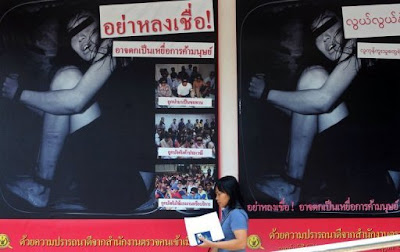Secretary of State Hillary Clinton called human trafficking a "terrible crime" as she presented the State Department's annual report on the issue in Washington, DC on June 14, 2010. The United States has put allies Singapore and Thailand as well as Vietnam on a human trafficking watch list, accusing them of failing to prevent women from being forced into prostitution.
A man hugs his son at a children's welfare centre in southwest China's Guizhou province after police rescued the boy, and dozens of other children, from human traffickers. China has remained on a US-compiled human trafficking watch list, unchanged from a year earlier.
A woman walks past a giant anti-human trafficking campaign poster displayed at an Immigration Bureau in Bangkok. A US report has estimated that 12.3 million people were the victims of trafficking in 2009-2010, including many women forced into prostitution.
Luis CdeBaca, pictured at a human trafficking event in New York, has said that Pakistan "has dramatically increased the number of convictions and prosecutions for human trafficking, undertaking creative efforts to prevent bonded labor".
via Khmer NZ News Media
By Shaun Tandon (AFP)
WASHINGTON — The United States on Monday put allies Singapore and Thailand as well as Vietnam on a human trafficking watch list, accusing them of failing to prevent women from being forced into prostitution.
The move opens the way for the United States to cut off some civilian assistance, although it usually functions as a symbolic means to pressure countries to take action.
Secretary of State Hillary Clinton, who has made women's and children's rights a signature issue, called human trafficking a "terrible crime" as she presented the State Department's annual report.
"All of us have a responsibility to bring this practice to an end," she said.
The report estimated that 12.3 million people were the victims of trafficking in 2009-2010, although it said there has been progress in the past decade.
The State Department added a number of Asian nations to its watch list -- Afghanistan, Brunei, Laos, Maldives, Singapore, Thailand and Vietnam.
Bangladesh, China, India, Micronesia, the Philippines and Sri Lanka remained on the list, unchanged from a year earlier.
North Korea, Myanmar and Papua New Guinea remained at the bottom level of countries that do not even meet the minimum standards on human trafficking.
Explaining the downgrade for Singapore, the report said that some women from China, the Philippines and Thailand are tricked into coming to the city-state with promises of legitimate employment and coerced into the sex trade.
The report said that while Singapore launched "some significant new steps" against trafficking, there were no "quantifiable indicators" that the government was identifying more victims or prosecuting more culprits.
The State Department said that Thailand was a source, destination and transit point for trafficking, with ethnic minorities and citizens of neighboring countries at particular risk of sexual abuse or forced labor.
Senator Jim Webb, who heads the Foreign Relations subcommittee on East Asia, had made an unusually open appeal not to place Thailand on the watch list.
Webb visited Bangkok this month and said US embassy staff disagreed with the intended downgrade as it could curb assistance for democracy and human rights programs in the wake of the kingdom's political violence.
The downgrade occurs "at a time when this type of aide is desperately needed to bolster political reforms in Thailand and to promote political stability," Webb said last week in a letter to Clinton.
The State Department recognized improvements in Pakistan, which was taken off the watch list, and Malaysia, which was on the list but removed from the lowest category of countries that do not meet minimum standards.
Pakistan "has dramatically increased the number of convictions and prosecutions for human trafficking, undertaking creative efforts to prevent bonded labor," Luis CdeBaca, the US envoy on human trafficking, told reporters.
Malaysian authorities "have acknowledged and begun to tackle their serious human trafficking problem, including intensified engagement with foreign governments," CdeBaca said.
From other regions, Cuba, Iran and Saudi Arabia remained in the rock-bottom category and the Dominican Republic was newly added.
Representative Christopher Smith, a Republican who authored the law that requires the human trafficking report, said that more countries should have been assigned the lowest rank.
"If we are willing to hold the Dominican Republic to account, as we should, it's outrageous that China, Vietnam and India get a free pass," Smith said.
Taiwan was upgraded and listed as fully compliant in efforts against human trafficking after starting new services for victims, CdeBaca said.
Australia, New Zealand and South Korea were also listed as fully compliant.
For the first time, the United States included itself in the report. It ranked itself in compliance.

































